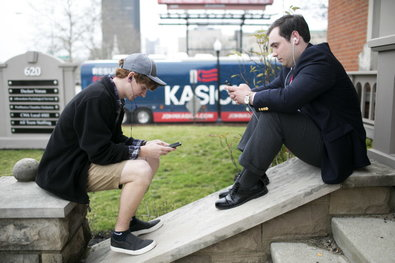
Do College Students’ Votes Really Matter in an Election?
There has been much talk about the power of the youth vote — particularly college students and their support for Senator Bernie Sanders. But does civic engagement and political activism at a university level matter for our country’s politics? Are college students really an important constituency?
* youth vote = 청년 유권자 표/ particularly = 특히, 특별히/ civic engagement = 시민적 관여/ political activism = 정치적 활동/ politics = 정치/ constituency = (특정 지역의) 선거구민[유권자들]; (특정 인물・상품 등의) 지지층[고객층]
 대학생들은 (선거에서) 정말로 중요한 유권자들인가요?
대학생들은 (선거에서) 정말로 중요한 유권자들인가요?
1. The ‘Snapchat Generation’ of Voters Is a Powerful One
Youth engagement and support (alone) still cannot win an election, but it can deliver the credibility needed to drive the public discussion.
2. Students Are Inconsistent Voters for a Reason
Voters are mobilized around their physical residential address, for young people living in dorms or even moving around after college, this is a problem.
3. They Could Have a Divisive Effect on the Electorate
The atmosphere on campuses means America's ideological extremism will grow, making political understanding more unlikely.
4. Having an Impact Beyond the Voting Booth
Young people's fluency in social media allows them to raise money and spread information about the candidates at a grassroots level.
Sample Essay
The ‘Snapchat Generation’ of Voters Is a Powerful One
Conventional wisdom says that for all the passion of their protests, young voters (what we call the “Snapchat Generation”) simply don’t show up at the polls like older, more “reliable” voters. So why pay attention to them?
The answer is to ask them. Nearly nine in 10 (87 percent) are either “extremely” or “very” likely to vote in the coming general election – an identical result to their parents and grandparents. And I believe them.
Thanks to Bernie Sanders, they care about politics and policy in a way that even exceeds 2008, when they singlehandedly gave Barack Obama the nomination and eventually the election. By showing up by the thousands for speeches, rallies and to knock on literally millions of doors, they made Obama more than just a curiosity whose time may someday come; they made him someone to believe in. Immediately. They were the canaries in the coal mine, sniffing out that there was something wrong with the previous generation of political leadership and something explosive in his personage, his ideas and his message.
Flash forward to 2016, and it’s happening again. Bernie Sanders has more support among first and second time voters than all the Republicans combined. It won’t make him president, or even the Democratic nominee, but it has been enough to make him a credible candidate, and his impact on the race is undeniable. A year ago, he was an asterisk in the polls. But thanks to the Snapchat Generation, he nearly brought down a political dynasty. For decades to come, he’ll be remembered for reshaping the entire debate, and perhaps the future of America. “Feel the Bern” will be a part of our lexicon forever.
Admittedly, I am biased in favor of youth participation – even if they rarely think or vote the way I do. They are too susceptible to offers of free stuff paid for by their parents’ generation, and too willing to reject the role America must play in the world. But what I like most is that young voters respond, above all else, to authenticity. They know a fraud when they see it, and they flock in droves to those politicians who say what they mean, and mean what they say.
And while the rallies in 2016 are not quite as large as 2008, even more young people are participating in the political discourse via social media. Snapchat and Twitter have replaced the convention of a coffee shop and the “water cooler” conservation as the place where youth gather to talk politics. Even old journalists and pundits (like me) have learned we need to go there if we want to be heard. We have learned from people less than half our age. They set the trends now.
True, youth engagement and support (alone) still cannot win an election, but it can deliver the credibility needed to drive the public discussion.





![]() 대학생들은 (선거에서) 정말로 중요한 유권자들인가요?
대학생들은 (선거에서) 정말로 중요한 유권자들인가요?






